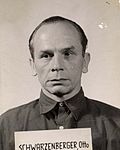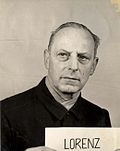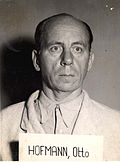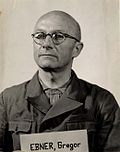| RuSHA trial | |
|---|---|
 First day of the RuSHA Trial, October 20, 1947 First day of the RuSHA Trial, October 20, 1947 | |
| Indictment | July 7, 1947, Nuremberg |
| Decided | March 10, 1948 |
The RuSHA trial (officially, United States of America vs. Ulrich Greifelt, et al) was a trial against 14 SS officials charged with implementing Nazi racial policies.
It was the eighth of the twelve trials held in Nuremberg by the U.S. authorities for Nazi war crimes after the end of World War II. These twelve trials were all held before U.S. military courts in their occupation zone in Germany, not before the International Military Tribunal, although they took place in the same rooms, at the Palace of Justice. The twelve U.S. trials are collectively known as the "Subsequent Nuremberg Trials" or, more formally, as the "Trials of War Criminals before the Nuremberg Military Tribunals" (NMT).
Only four of the fourteen defendants were members of the RuSHA (Rasse- und Siedlungshauptamt, the "Race and Settlement Main Office"). Others belonged to the office of the Reich Commissioner for the Consolidation of German Nationhood (Reichskommissar für die Festigung des deutschen Volkstums, RKFDV; a post held by Heinrich Himmler); the Repatriation Office for Ethnic Germans (Volksdeutsche Mittelstelle, VoMi); and the Lebensborn society. The charges centered on their racial cleansing and resettlement activities.
The judges in this case, heard before Military Tribunal I, were Lee B. Wyatt (presiding judge), Associate Justice of the Supreme Court of Georgia; Daniel T. O'Connell of the Superior Court of Massachusetts, and Johnson T. Crawford from Oklahoma. The Chief of Counsel for the Prosecution was Telford Taylor. The indictment was served on July 7, 1947; the trial lasted from October 20, 1947 until March 10, 1948.
Indictment
- Crimes against humanity in furtherance of "racial purity" programmes by kidnapping children, encouraging or compelling "non-Aryan" pregnant women to undergo abortions, providing abortion services and removing cases of abortion from the jurisdiction of Polish courts; plundering, deportation of populations from their native lands in occupied countries and resettling of so-called "ethnic Germans" (Volksdeutsche) on such lands, sending people who had had "interracial" sexual relationships to concentration camps, and general participation in the persecution of Jews.
- War crimes for the same reasons.
- Membership of a criminal organization, the SS.
All defendants were indicted on counts 1 and 2. Inge Viermetz was excluded from count 3. All defendants pleaded "not guilty".
Defendants
| Mug shot | Name | Function | Charges | Sentence | ||
|---|---|---|---|---|---|---|

|
Ulrich Greifelt | Chief of Staff of RKFDV | Found guilty of all three counts | Life imprisonment; died in prison in 1949 | ||

|
Rudolf Creutz | Deputy to Greifelt | Found guilty of all three counts | 15 years; reduced to 10 years; released in 1951; died in 1980 | ||

|
Konrad Meyer-Hetling | Office head in RKFDV | Found guilty of count 3 | Time already served (since May 27, 1945); released after the judgment; died in 1973 | ||

|
Otto Schwarzenberger [de] | Office head in RKFDV | Found guilty of count 3 | Time already served (since May 2, 1945); released after the judgment; died in 1978 | ||

|
Herbert Hübner (SS officer) [de] | Chief of Poznań office of RKFDV and representative of RuSHA in western Poland | Found guilty of all three counts | 15 years; reduced to 10 years; released in 1951 | ||

|
Werner Lorenz | Head of VoMi | Found guilty of all three counts | 20 years; reduced to 15 years; released in 1954; died in 1974 | ||
| Heinz Brückner [de] | Office head at VoMi | Found guilty of all three counts | 15 years; reduced to 10 years; released in 1951; died in 1968 | |||

|
Otto Hofmann | Head of RuSHA until April 20, 1943, later head of the SS in southwestern Germany | Found guilty of all three counts | 25 years; reduced to 15 years; released in 1954; died in 1982 | ||

|
Richard Hildebrandt | Head of RuSHA, Hofmann's successor | Found guilty of all three counts | 25 years; turned over to Polish authorities and executed in 1951 | ||

|
Fritz Schwalm [de] | Chief of Staff of RuSHA and head of the "Immigration Office" (Einwandererzentrale, EWZ) in Łódź | Found guilty of all three counts | 10 years; released in 1951; died in 1985 | ||

|
Max Sollmann [de] | Head of the Lebensborn society | Found guilty of count 3 | Time already served (since July 6, 1945); released after the judgment; died in 1978 | ||

|
Gregor Ebner | Head of Health Dept. of Lebensborn | Found guilty of count 3 | Time already served (since July 5, 1945); released after the judgment; died in 1974 | ||

|
Günther Tesch [de] | Head of Legal Dept. of Lebensborn | Found guilty of count 3 | Time already served (since May 13, 1945); released after the judgment; died in 1989 | ||

|
Inge Viermetz | Deputy to Sollmann | Acquitted of counts 1 and 2 | Acquitted; died in 1997 | ||
The four Lebensborn members were not found guilty on counts 1 and 2 of the indictment. The tribunal considered the Lebensborn society not responsible for the kidnapping of children, which was carried out by others.
Greifelt died in Landsberg Prison on February 6, 1949. Hildebrandt was turned over to Polish authorities. He was put on trial for different atrocities in Poland and sentenced to death. He was hanged on March 10, 1951. Hübner, Brückner, and Schwalm were released in 1951. Also in that year, the sentences of Hofmann and Lorenz were reduced to 15 years, and that of Creutz to 10 years. Hofmann was released in 1954.
References
- ^ "The Mazal Library". Archived from the original on September 8, 2002. Retrieved January 21, 2005.
- Priemel, Kim Christian (2016). The Betrayal: The Nuremberg Trials and German Divergence. Oxford University Press. p. 256. ISBN 978-0-19-256374-3.
External links
- Trial proceedings from the Library of Congress
- Description from the U.S. Holocaust Memorial Museum
- Notes on the trial
- Lebensborn (in German)
| Nuremberg trials | |||||||||||||
|---|---|---|---|---|---|---|---|---|---|---|---|---|---|
| Legal basis | |||||||||||||
| Chief prosecutors |
| ||||||||||||
| Judges | |||||||||||||
| Defendants |
| ||||||||||||
| Witnesses | |||||||||||||
| Aftermath | |||||||||||||
| Films |
| ||||||||||||
| The Holocaust | |||||||||||||||||||||||
|---|---|---|---|---|---|---|---|---|---|---|---|---|---|---|---|---|---|---|---|---|---|---|---|
| |||||||||||||||||||||||
| |||||||||||||||||||||||
| |||||||||||||||||||||||
| |||||||||||||||||||||||
| |||||||||||||||||||||||